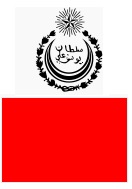By Abdul Ahmed III
I am pleased to learn that Madame Edna Aden uses the term as well (as the article claims). The honorable Madame Edna Aden had gallantly served her people for more than 50 years. I hope many wise men and women would adopt the term “the former Somalia” as a term that crystallizes an empirical fact; the bitter truth of the failed idea of an ethnic Somali nation.

I have in the past explained the origin, the meaning, and the usage of the term “The former Somalia” in an article titled A Sacred Abuse: The Former Somalia & Its Decadent Heroes. Note that I use the definitive form as in “the former Somalia” and not “former Somali” as was described in a recent WardheerNews article by Bashi Hosh, titled Bewitched By Colonial History: The Existential Threat To Somali State (hereafter referred to as the article).
Bashi Hosh’s article is well written Pan-Somali article. I am tempted to disregard Bashi’s mind-dulling article for it confounds distinct technical topics, paradoxically reciting opposing schools of thought (Nationalism, Populism, Marxism, Neoliberalism and Social Justice Movements). Yet, I would not disregard it because – with careful attention – one could easily unearth the substance of the article as edification and promotion of hatred against Somaliland and Puntland.
I defer to Somalilanders to address the open animosity towards Somaliland. I would, however, share with you that the unification was a political act of courage spearheaded by Mohamed Ibrahim Egal. To learn more about this, consider reviewing Ambassador, Abdullah Congo’s interview with Horn Cable TV. Congo explains the humiliation that the northern delegation received in Mogadishu and the intricacies of negotiations between the British Somaliland and the Italian Somaliland in the following paragraphs, I address the essence of the article, the Anti-Punt spirit of the article, I define Anti Puntite attitudes and provide a brief but enlightening history of the people of Puntland.
Anti-Puntism is an open or sometimes concealed prejudice against the people of Puntland or the pre-colonial Sovereign Sultanates. It manifests itself as open hostility or an implicit bias. Its symptoms include the denial of history of Puntland, and the attribution of all the misfortunes of the former Somalia to the people of Punt. – i.e. everything from colonization, destruction of Somalia and paradoxically Mogadishu’s miserable existence today.
Sadly, for the Anti-Puntites, History is indelible and objective reality; facts and figures are accessible if one desires to research, for history leaves behind enduring artifacts. The ancient and contemporary history of Puntland or that of the Sovereign Sultanates is not an illusion or delusion! Archeological discoveries verify an ancient flourishing civilization in Hafun, and Ras Aseyr (Chittick, 1976; Smith & Wright, 1988). In comparison, Mogadishu is rather a new Arab settlement I have discussed in my article titled Mogadishu an Arab City (Wardheernews 2011).
In the contemporary period, researchers and explorers – Revoil, Robecchi, Ravenstein, Speeke, among others – provided a wealth of information about pre-colonial life in the Sovereign Sultanates; the Regal Sultanate of Warsengeli, the Regal Sultanate of Obbia , the Kingdom of Migurtenia and the Dervish Territories. These were indeed precolonial states engaged in trade with South Arabia, the Benadir Coast, Zanzibar, and the wider Indian Ocean (Kapteijns & Boqor, 2009)

British and Italian colonial history archives preserve sizable primary source artifacts and documents. These archives provide rich material to study how the Sovereign Sultanates maintained relationships with Abyssinia, Germany, Italy, Oman, Ottoman Sultanate, and the United Kingdom among others. The Sovereign Sultanates employed their resources, power and political maturity to maintain and occasionally challenge European dominion. Today, the legal maneuvers and diplomatic activities of the Sovereign Sultanates are part of jurisprudence studies in the practice of international law.
In the 1880s, Italy signed similar treaties with Abyssinia, Migurtinia, and Obbia none of which was accepted as a direct rule at the time by Abyssinia, and the Sovereign Sultanates. A reality that was cemented after the Italian defeat in Adua. Fearful of the same fate, Italians never attempted to challenge the powerful Sultanates. The Sovereign Sultanates were never under Italian sovereignty until 1927.
Fascist Italy declared its intention to bring the Sultanates under direct Italian sovereignty on June 9, 1924. Several battalions from Eretria and individual commanders from Italian Libya carried out a sustained sea and land assault on the Sovereign Sultanates. The Royal Sultanate Army defeated the Fascist in many battles in Beletweyn, El-bur and elsewhere (Hess, 1966). However, the Sultanates succumbed after sustained multi-year sea embargo and feracious landbased hostility. Mussolini’s army annexed the Sovereign Sultanates in 1927 as reported by the New York Times on March 11, 1927. It took the fascists nearly 3-years to occupy the Royal Palaces capturing the Royal family in the Spring of 1927 (and 5 more years to pacify the territories). Italian ships forcibly moved the leadership to the colonial capital Mogadishu (Kapteijns & Boqor, 2009).
The Italian invasion of Punt destroyed the largest cities in the Somali inhabited areas of Horn of Africa, The youth was forcibly conscripted from all corners, the elites, bureaucrat, and technocrats were forcibly expelled or forcibly moved to Mogadishu. Our cities were renamed; Hafun was renamed as Dante, Galkayo was renamed as Rocca Littorio. A history that the Anti-Puntites are either denying or are conveniently unaware of! But those of us from the Land of Punt kept our history, we also kept artifacts from the homeland. Every Punt family house in Mogadishu kept pictures of the Royal family, artifacts and stories from the past. We lived that history and we still live and are inspired by our glorious history today.
Before the invasion, the authority embodied in the Royal Institutions were potent. The Royal structures of institutional control worked fairly well until the fascist invasion. The years since the forced annexation of Puntland with Somalia in 1927, the Royal sultanate institutions weakened. Worse, the generations that followed the fascist invasion neglected the homeland (Lewis, 2008).
After the defeat of the fascist in WWII, the youth of Puntland chose to stay in the south, instead of going back to rebuild their ancestral Sovereign Sultanate. They zealously accepted the south and worked with Somali speaking population of the South. Puntlanders were the overwhelming majority of the organizing committee of the Somali Youth League (SYL) in 1943. They fought for Somali people’s independence.
Knowing that the idea of a Somali nation is ahistorical, a post-WWII invention. Many skeptics from the Sovereign Sultanates though reluctant, tolerated the zeal of the sons of the Sultans. But, history had a surprise in store for all; the undeniable confirmation that ethnicity is neither essential nor a sufficient condition to create and maintain a nation-state.
Abused and vilified and having learned from the 80-year exile in the south, Puntlamnders are now back in their promised homeland and certainly better off. (That is a small piece of an undeniable glorious history). Today Puntland is a viable state and full of vibrant people who have a stake in their land. Puntland is better administered and it developed fairly well since its creation, Puntland functions as an independent state and complies with the fundamental conditions of statehood. (Doornbos, 2011). Somaliland and Puntland can be a good example of governance, and state-building (Hesse, 2010c, 2010b; Johnson & Smaker, 2014),
Puntland will not restore the former Somalia, nor will it solve the current troubles in what is left of the former Somalia. What you call Somalia today is a mockery. As Brain Hess stated, the present-day ‘Somalia’ is a myth kept alive by international donors (Hesse, 2010a). Puntland, on the other hand, is thriving with no or little support from the intranational community. For instance, in 2006, Puntland defeated an invading army of Al-Shabaab equipped with AMISOM weapons with no assistance from any external army.
While the south is busy in tribal wars or Orwellian desire to rule Punt, the people of Puntland moved on to mind their affairs having no stake in Mogadishu. The only viable option for Puntland is a complete restoration of its sovereignty.
Malcontents of freedom mind your business.! Spare me the hue and cry about nation-building, People of Puntland built their country. Build yours and beg me not.
Abdul Ahmed III
Email:[email protected]
————————
References
Chittick, H. N. (1976). An archaeological reconnaissance in the Horn: the British-Somali Expedition, 1975. Nairobi, Kenya: British Institute in Eastern Africa.
Doornbos, M. (2006). When is a State a State? Exploring Puntland, Somalia. Global Forces and State Restructuring, 175–194. doi: 10.1057/9780230502154_8
Doornbos, M. (2011). ¿ C uándo un estado es un estado ? E xplorando. Relaciones Internacionales, Núm. 18, Octubre de 2011, 157–178.
Hess, R. L. (1966). Italian colonialism in Somalia. Chicago, IL: The University of Chicago Press.
Hesse, B. J. (2010a). Introduction: The myth of “Somalia.” Journal of Contemporary African Studies, 28(3), 247–259. https://doi.org/10.1080/02589001.2010.499232
Hesse, B. J. (2010a). Introduction: The myth of “Somalia.” Journal of Contemporary African Studies, 28(3), 247–259. https://doi.org/10.1080/02589001.2010.499232
Hesse, B. J. (2010b). Lessons in successful Somali governance. Journal of Contemporary African Studies, 28(1), 71–83. https://doi.org/10.1080/02589000903542608
Hesse, B. J. (2010b). Lessons in successful Somali governance. Journal of Contemporary African Studies, 28(1), 71–83. https://doi.org/10.1080/02589000903542608
Hesse, B. J. (2010c). Where Somalia works. Journal of Contemporary African Studies, 28(3), 343–362. https://doi.org/10.1080/02589001.2010.499234
Hesse, B. J. (2010c). Where Somalia works. Journal of Contemporary African Studies, 28(3), 343–362. https://doi.org/10.1080/02589001.2010.499234
IBRD. (1957). Report on The Economy of the Trust Territory of Somaliland. Washington, DC: IBRD.
Johnson, M. C., & Smaker, M. (2014). Somaliland and Puntland offer rare opportunities to examine what state build- ing in Africa looks like without international rec- ognition and its related. 60(4), 3–23. https://doi.org/10.1353/at.2014.0014
Kapteijns, L., & Boqor, M. M. (2009). Memories of a Mogadishu childhood, 1940-1964: Maryan Muuse Boqor and the women who inspired her. International Journal of African Historical Studies, 42(1), 105–116.
NYT. (1927). Italy Completes Conquest of Somaliland; Sultanates Yield After Winter of Fighting. New York Times March 11, 1927. Retrieved May 18, 2008, from https://www.nytimes.com/1927/03/11/archives/italy-completes-conquest-of-somaliland-sultanates-yield-after.html.
Ravenstein, E. G. (1894). The Recent Territorial Arrangements in Africa. The Geographical Journal, 4(1), 54. doi: 10.2307/1774176
Révoil Georges. (1888). Voyage au pays comalis dix mois à la côte orientale dAfrique: la Vallée du Darror et le Cap Guardafui. Paris: librairie déducation A. Hatier.
Robecchi, L. (1893). Luigi Bricchetti Robecchi’s Journeys in the Somali Country. The Geographical Journal, 2(4), 359. doi: 10.2307/1773922
Smith, M. C., & Wright, H. T. (1988). The Ceramics from Ras Hafun in Somalia: Azania: Archaeological Research in Africa, 23(1), 115–141. doi: 10.1080/00672708809511389
The Italian Yearbook of International Law. (1980). La missione del Sultano di Obbia in Etiopia; ITALIAN PRACTICE RELATING TO INTERNATIONAL LAW.
We welcome the submission of all articles for possible publication on WardheerNews.com. WardheerNews will only consider articles sent exclusively. Please email your article today . Opinions expressed in this article are those of the author and do not necessarily reflect the views of WardheerNews.
WardheerNew’s tolerance platform is engaging with diversity of opinion, political ideology and self-expression. Tolerance is a necessary ingredient for creativity and civility.Tolerance fuels tenacity and audacity.
WardheerNews waxay tixgelin gaara siinaysaa maqaaladaha sida gaarka ah loogu soo diro ee aan lagu daabicin goobo kale. Maqaalkani wuxuu ka turjumayaa aragtida Qoraaga loomana fasiran karo tan WardheerNews.
Copyright © 2024 WardheerNews, All rights reserved


